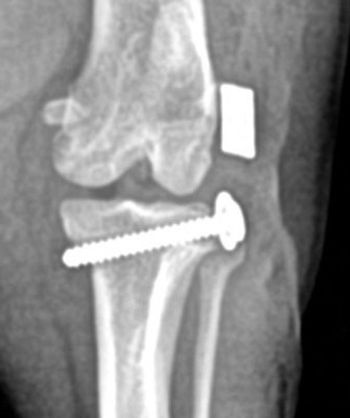
Tips for safely anesthetizing patients with gastrointestinal obstructions

Patients with gastrointestinal obstructions are higher risk anesthetic patients who require careful preparation and monitoring to maximize outcomes
Patients with gastrointestinal (GI) obstructions often require exploratory surgery. These patients can vary in their level of stability at presentation depending on how long the obstruction has been present and the location of the obstruction in the GI tract. Being prepared with a plan to maximize patient stability prior to anesthesia and anticipate potential complications will improve patient outcomes. During the recent Directions in Veterinary Medicine Symposium in Arlington, Virginia, S. Bryce Dooley, DVM, MS, DACVAA, discussed a practical approach to anesthesia for patients with GI obstructions.
Preoperative workup and stabilization
It is essential for these patients to have bloodwork in the preoperative period. “These are not healthy patients,” Dooley stated. “Doing bloodwork on them is due diligence.” Common abnormalities include hemoconcentration, electrolyte imbalances, and metabolic alkalosis. Including electrolytes in blood panels is important as abnormal levels can lead to cardiac arrhythmias. Even if the patient has had bloodwork a day or two prior, repeating bloodwork prior to anesthesia is necessary as many lab values can change quickly secondary to GI obstruction. Electrocardiogram (ECG) and serial blood pressure monitoring should also be started during stabilization, especially in the event of severe electrolyte abnormalities.
While these patients need surgery urgently, they must be stabilized prior to inducing anesthesia. Many are dehydrated from extensive vomiting. Fluid therapy using balanced electrolyte solutions is necessary to correct dehydration and hypovolemia. Severe electrolyte disturbances should be corrected as well, remembering that slow correction is often needed.
“I absolutely give these patients Cerenia,” said Dooley, though she cautions that intravenous administration can cause both hypotension and tachycardia. She also recommends ondansetron and pantoprazole. The rationale behind pantoprazole is that, in the event of regurgitation, the fluid will be less acidic and irritating to the esophagus. For pantoprazole to work, it needs the lower pH of the stomach, so it should not be administered concurrently with famotidine.
Patients also benefit from low doses of opioids to provide pain relief and sedation during the pre-operative workup. However, Dooley cautioned that patients should not be overly sedate as this increases the risk of aspiration. If possible, a nasogastric tube should be placed preoperatively to allow manual evacuation of fluid in the stomach.
Considerations for induction
The risk of regurgitation and subsequent aspiration are high during induction, especially in cats with gastric obstructions. Dooley encouraged veterinary teams to be prepared by having a plan for rapid induction and intubation with suction ready. In the event of regurgitation, the patient’s head should be tilted down with the nose lower than the larynx while the mouth and throat are suctioned. Being prepared and preventing aspiration “can be the difference between a patient going home tomorrow and dying right there,” said Dooley.
Peri-operative plan
ECG and blood pressure monitoring should be continued throughout the procedure and maintaining appropriate volume status is crucial. Fluid therapy should be continued and closely monitored. In some cases, pressor therapy is needed to maintain adequate blood pressure and perfusion during surgery.
Dooley reminded veterinarians that abdominal organs are innervated by the vagus nerve, and manipulation of visceral organs can lead to a drop in the heart rate. Atropine should be on hand in the event of severe bradycardia.
Intraoperative continuous-rate infusions should be considered to help manage pain and decrease the amount of inhalant anesthetic. Lidocaine is an excellent option as it provides good visceral pain control and decreases inflammatory mediators in the body.
Creating a smooth recovery experience
Following surgery, patients should be recovered in sternal recumbency to decrease aspiration risks. The endotracheal tube should be removed with the cuff slightly inflated as long as there is no resistance to continue to protect the airway throughout extubation.
Continuous rate infusions for pain control should be continued postoperatively, though caution should be used with opioid infusions as they can slow the GI transit time. If a nasogastric tube was placed prior to or during the surgery, fluid can be periodically evacuated from the stomach through manual aspiration.
Take home points
Patients suffering from gastrointestinal obstructions requiring surgery must be stabilized prior to anesthesia. Prevention of regurgitation and aspiration are essential, especially during induction and recovery, when patients are at especially high risk for these complications. Dooley encouraged veterinarians to use multimodal anesthesia and pain control and be prepared for potential complications to maximize patient outcomes.
Reference
Dooley S. Anesthetic Considerations for the Obstructed Patient +/- Pneumothorax. Presented at: Directions in Veterinary Medicine symposium; Arlington, Virginia. April 21-22, 2023.
Newsletter
From exam room tips to practice management insights, get trusted veterinary news delivered straight to your inbox—subscribe to dvm360.






